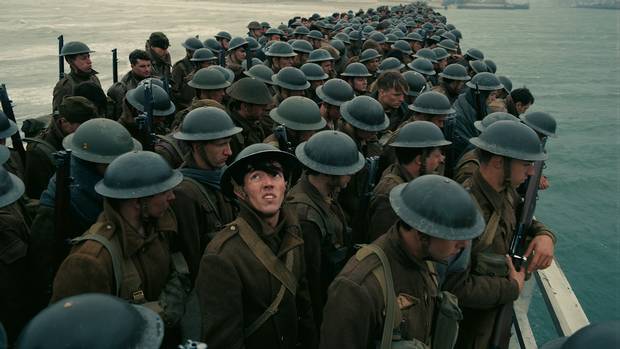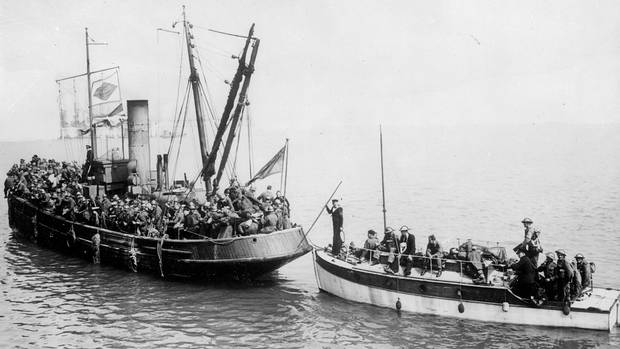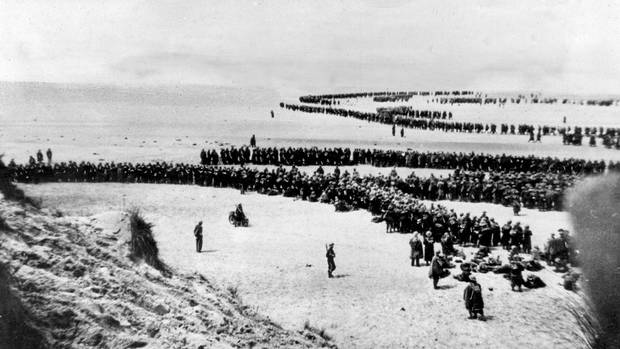The most astounding scene in Christopher Nolan's masterpiece is of men standing still, thousands of them lined up single file in long, snaking columns as far as the eye can see, until they're just a dark smudge on the horizon. The queue is a boring British invention, but there's heroism as dramatic as a cavalry charge in the sublime stoicism of those endless lines of Tommies waiting for evacuation from Dunkirk. When dive bombers scream down on them and fighter plane machine guns rip the lines, the defenceless men lie flat, huddled together on the sands, then the survivors stand up again and again in the queues that never seem to move forward. Nobody can sleep. They wait and wait for death or deliverance.
Dunkirk is a Second World War movie that isn't. Nazi Germany is not cast as the enemy. There is nary a swastika in sight. The waiting men know that the tanks about to crest the sand dunes and scythe into their ranks are the Panzer divisions that have conquered Poland, Belgium the Netherlands and France. But Mr. Nolan never lets us see a German tank or stormtrooper. The theme of a nameless menace is set in an opening scene. Six hungry soldiers rummage in the deserted shell of the town of Dunkirk, their deaths foretold in a shower of surrender leaflets. Ominous forces – unseen and faceless – fulfill the predictions until just one baby-faced squaddie is left, running at us. He dodges past a sandbagged post manned by a handful of French defenders until suddenly, from the sand dunes, he has sight of the Channel, the red glow from ships ablaze offshore, the panoply of dense black smoke from burning oil tankers – and almost half a million immobile men of the British Expeditionary Force (BEF), human grains of sand in the vastness.

A scene from the Warner Bros. Pictures action thriller “Dunkirk,” a Warner Bros. Pictures release.
Courtesy of Warner Bros.
Mr. Nolan has been criticized for copping out in the blame game of war movies at a time when Nazi wannabes in the United States think they have been endorsed by the President. But the director's abnegation has the merit of concentrating attention where he wants it: on the men at the receiving end of British history, including the history of appeasement. We can best view Dunkirk as an allegorical tribute to bravery and sacrifice, valour in the face of overwhelming force. Filmed with large-format cameras, the realism is stunning, especially the parabolic actions of fighter planes in dogfights high above the beaches. They are hold-your-breath riveting, at once terrifying and lethally graceful. To hell with computer-generated imagery. Mr. Nolan sits you in the cockpit of a real RAF Spitfire, outnumbered four to one, and you shoot, slip, slither and roll to escape the attackers hurtling vertiginously all around you.
The film has special resonance for me. In 1940, as a kid still in short pants, I came unknowingly across a bunch of BEF soldiers who only hours before had escaped Dunkirk and made it, barely alive, to another beach for "rest and recuperation." This was Rhyl in northern Wales. My father, the driver of a steam locomotive, had been granted a six-day break from hauling munitions through the blackness of wartime Britain. He took the family of six to Rhyl.
None of us had any idea who the men were lying prostrate in clusters on sands beyond the pier, remote from the thinned-out families seeking relief amid the stress of the war. But Dad was gregarious, forever curious. I tagged along with him and can see him now, squatting spellbound for two hours among the Dunkirk men, offering a cigarette here and here. At 39, he must have been 15 to 20 years older than the soldiers, but they were so haggard you would never have known it. They were a forlorn group, unshaven, some in remnants of uniforms, some in makeshift outfits of pajamas and sweaters, not a hat between them. They knew they owed their lives to the heroism of the rearguard, French and British, who had kept the escape corridor open. But Dad said they were bewildered, bitter that the Maginot Line had been too short, bitter with the Royal Air Force (without good cause).
READ MORE FROM THE GLOBE
"They said they had nothing to fight with." Indeed, they did have only aging rifles, clapped-out six-inch howitzers on iron wheels, no machine gun comparable to the German Mauser. The picture they presented was very much at odds with the cheery gloss fed to the public by the authorities and the press, who were less concerned with recording history than keeping up morale on the home front.
It took 20 years for history to catch up with a truer picture. So rattled was the British government, before Winston Churchill took over on May 10, it was thought 30,000 troops at most might be rescued. The miracle of Operation Dynamo is that by June 4, 1940, no fewer than 338,226 were brought back to Blighty – 198,000 of them BEF soldiers. About 800 or so skippers of shallow draft whalers, motorboats, dinghies, steamers, lifeboats, fishing trawlers, barges, tugs and ferries came valiantly across the Channel. They are the stuff of legend – and rightly so.

Two of the many small boats which helped to bring the Allied troops in the emergency evacuation across the English Channel from Dunkirk, France, are shown on June 4, 1940 in World War II.
But Mr. Nolan avoids a climactic representation of the "little ships" drama. He confines his account of the amateur rescuers to Mark Rylance arriving early in his yacht in a tiny flotilla. The treatment disappoints anyone looking for an emotional grand finale, but it can be justified because the romance of the little ships obscured what the Royal Navy did, which was rescue more than half the men.
Captain William Tennant, who oversaw the evacuation, recognized the limits of small boats ferrying 10 to 15 soldiers to larger vessels offshore. Dunkirk's harbour had been wrecked, but Capt. Tennant calculated that a destroyer, capable of carrying a thousand, might be able to berth at one of the two long stone breakwaters, or moles. They tried it and it worked, so Capt. Tennant tasked Canadian-born Commander J. Campbell Clouston to be the piermaster in charge of the flow of exhausted men from the eastern mole. Cdr. Clouston, a cool 39-year-old with a bullhorn and a pistol for any sign of panic, got survivors into groups of 50 for the long, precarious walk of almost a mile along the mole from the beach to the ship. Over five tense days and nights, a phenomenal 200,000 escaped that way. When his work was all but done, Clouston lost his life at sea after a Stuka attack.
His achievement is not properly explained in Dunkirk, and his identity is subsumed in the composite character of piermaster Commander Bolton. But Cdr. Clouston's leadership is given point in an incidental but intriguing bit of casting. Kenneth Branagh plays Bolton. He does it well, but there's a radiance to the role. When moviegoers hear Branagh speak, they hear the voice of his Henry V at Agincourt telling his soldiers that on this Saint Crispin's Day "we few, we happy few, we band of brothers" shall be remember'd to the end of the world and gentlemen now a-bed shall think themselves accursed they were not there to fight with them.
Standing on the breakwater, he remarks that the thousands trapped on the beach can see England – the white cliffs of Dover are but 26 miles away. As he speaks, across the Channel on May 28 one gentleman not a-bed is rallying Britain to fight to the finish. The appeasers, led by Lord Halifax, had been arguing that Britain should accept defeat and embrace a plan for peace advocated by Mussolini – i.e., surrender. "I am convinced," Churchill tells his cabinet, "that every one of you would rise up and bear me down from my place if I were for one moment to contemplate parley or surrender. If this long island story of ours is to end at last, let it end only when each one of us lies choking in his own blood upon the ground."
The ministers did not bear him down. They rose up to defend freedom and democracy. And it would not have been won by the Western alliance without those defeated men on the beach, so memorably portrayed in Dunkirk. They lived to fight again.
Sir Harold Evans, editor-at-large for Reuters, is the author of My Paper Chase.


